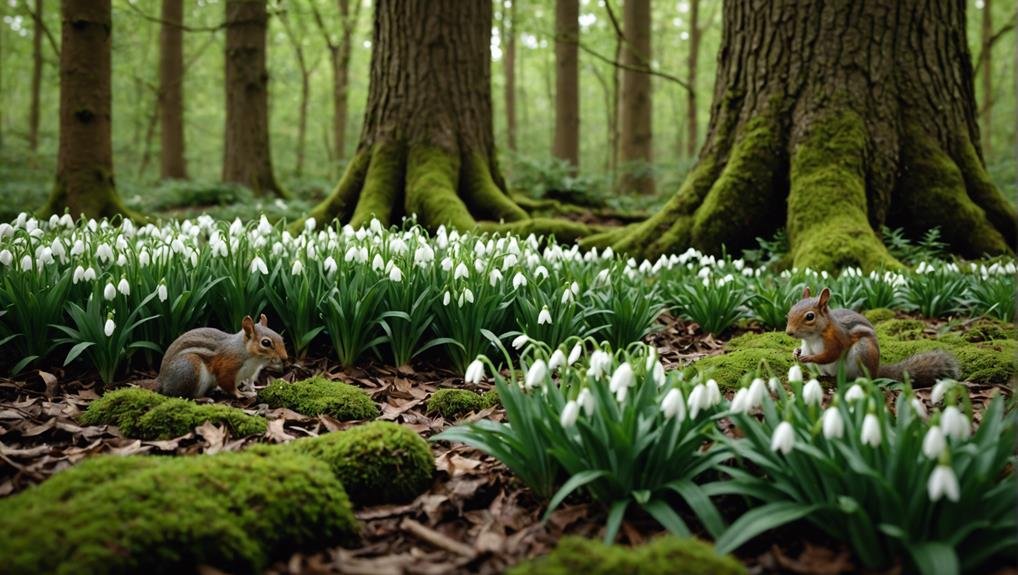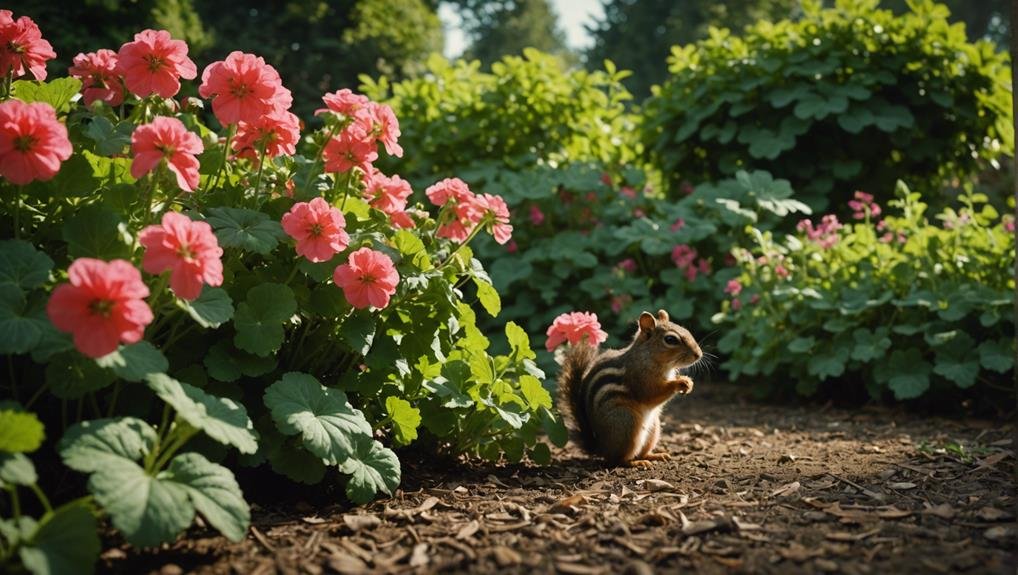If you want to keep squirrels at bay in your garden, consider planting daffodils, alliums, snowdrops, hyacinths, and geraniums. Daffodils, originally from the Mediterranean region, give off a strong scent that repels squirrels and deer. Alliums, known for their powerful aroma, work well as squirrel deterrents, especially when planted in groups. European snowdrops contain galanthamine, a natural substance that makes them unpleasant to squirrels. Hyacinths not only smell delightful but also attract pollinators while keeping squirrels away. Geraniums, with their strong fragrance, are easy to maintain and help deter squirrels. By strategically incorporating these plants into your garden, you can protect it from pests and enhance its beauty and functionality. Explore more effective strategies below.
Some of the links in this article may be affiliate links. If you make a purchase through these links, we may earn a small commission at no extra cost to you. Thank you.
Daffodils' Squirrel Defense
Originally from the Mediterranean region, daffodils (Narcissus spp.) are not only known for their vibrant blooms from late winter to spring but also for their ability to naturally deter squirrels due to their strong scent. These flowers serve as an effective repellent against squirrels and deer, making them a valuable asset in gardens. Planting daffodils in close proximity intensifies their natural fragrance, increasing their effectiveness in warding off pests. Beyond their visual appeal, daffodils play a practical role in safeguarding other plants from wildlife disruptions. Their resilience and pest-repelling qualities make them a smart choice for gardeners looking for both beauty and functionality in their outdoor spaces.
Alliums' Natural Deterrent
Alliums, with their potent scent and natural compounds, are excellent for deterring squirrels in the garden. These root vegetables, native to the Northern Hemisphere, thrive in soil rich in nutrients. The strong odors they release can effectively repel squirrels, making them a valuable addition to any garden.
For optimal results:
- Plant in clusters: Clustering alliums together boosts their scent and effectiveness.
- Combine with other deterrents: Pairing alliums with Fritillaria, known for its unique patterns, can enhance protection against squirrels.
- Utilize culinary benefits: Incorporating alliums, which have culinary uses, along with Galangal in the garden can provide dual benefits.
- Maintain soil fertility: Ensuring the soil remains nutrient-rich will support the growth and scent production of alliums.
Toxic Snowdrops

The common snowdrop, native to Europe, contains toxic alkaloids in its bulbs, particularly galanthamine, which can cause vomiting and diarrhea in pets if ingested. This natural deterrent is effective against squirrels and other critters, making it a robust choice for gardens. Despite their delicate appearance, snowdrops are hardy plants that can easily naturalize in garden settings. Incorporating snowdrops into your garden not only adds visual appeal but also helps keep unwanted wildlife at bay.
Hyacinth's Fragrance Shield
Hyacinths offer a potent defense against squirrels with their delightful fragrance, making them an excellent addition to your garden. These beautiful plants not only look appealing but also repel squirrels effectively. Here are some key reasons why hyacinths are a great choice for squirrel deterrence:
- Fragrance: Hyacinths emit a strong scent that squirrels dislike, helping to keep them away from your garden.
- Toxic Compounds: The bulbs of hyacinths contain toxic substances that deter squirrels from eating them.
- Biodiversity Support: Hyacinths attract honey bees, contributing to the diversity of pollinators in your garden.
- Natural Propagation: Ants assist in dispersing hyacinth seeds, aiding in their natural spread.
Consider planting hyacinths alongside other squirrel deterrents like Fritillaria and Galangal for a comprehensive strategy to protect your garden from these pesky critters. Remember, a mix of beauty and functionality can go a long way in creating a harmonious garden environment.
Geraniums' Versatile Protection

Geraniums are not just beautiful flowers with various scents; they also serve as a natural squirrel deterrent in gardens. These plants emit strong odors that squirrels find unpleasant, keeping them away from your precious plants. Taking care of geraniums is easy, requiring only regular watering, proper sunlight, and occasional pruning. Their versatility allows you to plant them in pots or directly in the ground, giving you flexibility in your garden design.
Geraniums are a great choice for gardeners seeking a natural way to protect their plants from squirrels. Their strong scents and low maintenance make them an excellent addition to any garden, providing both beauty and practicality.
Conclusion
In summary, incorporating plants like daffodils, alliums, snowdrops, hyacinths, and geraniums strategically can effectively deter squirrels in gardens while adding beauty to the environment. By utilizing these natural defenses, a harmonious space is created that discourages the presence of these persistent rodents. This method promotes sustainability and biodiversity, ensuring a flourishing garden free from the disturbances caused by squirrels.

